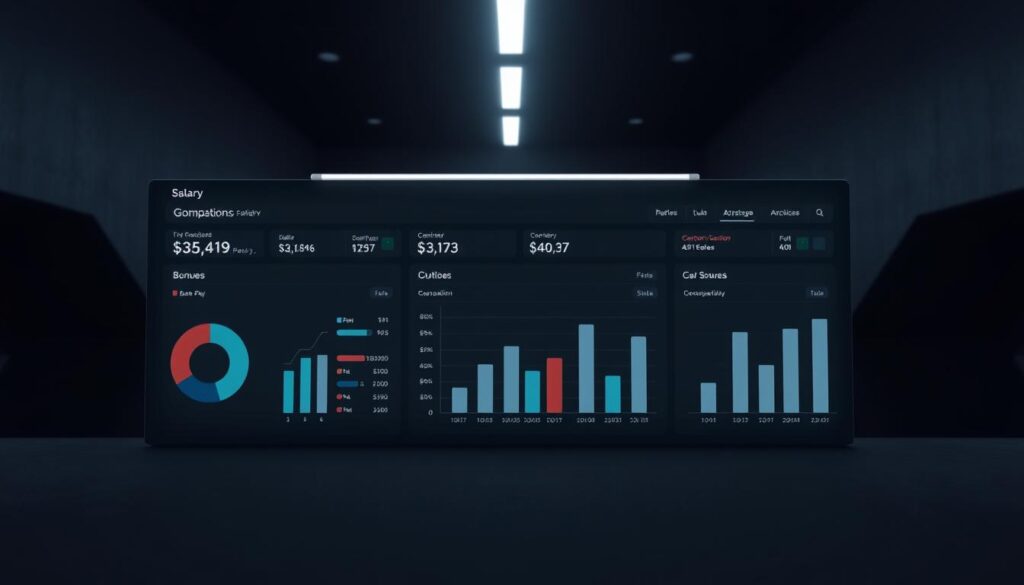The manufacturing landscape in the Midwest is undergoing a significant transformation with the emergence of new tech roles. As technology advances, the demand for skilled professionals in remote tech roles is on the rise, changing the way manufacturing operates.
Understanding the salaries and application process for these positions is crucial for both employers and job seekers. This article provides an overview of the emerging tech roles in Midwest manufacturing, including insights into compensation and how to navigate the hiring process.
As the industry continues to evolve, staying informed about the latest trends and opportunities is essential. This guide aims to equip readers with the knowledge needed to succeed in this dynamic field.
Key Takeaways
- Overview of emerging tech roles in Midwest manufacturing
- Insights into salaries for remote tech positions
- Step-by-step application guide for job seekers
- Trends shaping the future of manufacturing technology
- Tips for employers looking to fill remote tech roles
The Transformation of Midwest Manufacturing Through Remote Work
The Midwest manufacturing sector is undergoing a significant transformation with the integration of remote work. This shift is driven by technological advancements and the need for flexibility in an ever-changing global market. As a result, manufacturing companies in the Midwest are reaping the benefits of a more adaptable workforce.
Recent Surge in Remote Positions
The recent surge in remote positions within Midwest manufacturing has been driven by the need for specialized skills and the adoption of digital technologies. Companies are now more open to hiring talent beyond geographical boundaries, leading to a more competitive and diverse job market. This shift has enabled professionals to access better job opportunities without relocating.
Economic Impact on the Region
The economic impact of remote work on the Midwest region is multifaceted. On one hand, it has opened up job opportunities for local residents, potentially boosting local economies through increased consumer spending. On the other hand, it has also raised concerns about the long-term effects on local businesses and the need for infrastructure adjustments to support remote work effectively.
Current State of Manufacturing Technology Jobs in the Midwest
The Midwest manufacturing sector is undergoing a significant transformation with the integration of advanced technologies. This shift is creating new opportunities for tech professionals and changing the landscape of manufacturing jobs in the region.
Key Technology Adoption Trends in 2023
In 2023, the Midwest manufacturing sector is witnessing a surge in the adoption of Industry 4.0 technologies, including Artificial Intelligence (AI), Internet of Things (IoT), and additive manufacturing. These technologies are enhancing operational efficiency, improving product quality, and driving innovation.
Regional Manufacturing Technology Hubs
The Midwest is home to several regional manufacturing technology hubs. Cities like Chicago, Detroit, and Indianapolis are emerging as key centers for manufacturing innovation, with a high concentration of tech jobs and a strong ecosystem of startups and established manufacturers.
Top In-Demand Remote Tech Positions in Manufacturing
As manufacturing continues to evolve, certain remote tech positions have gained prominence due to their critical role in optimizing production processes. The integration of technology in manufacturing has led to the creation of new job roles that are in high demand.
Industrial IoT Specialists
Industrial IoT Specialists are crucial for implementing and managing IoT solutions in manufacturing environments. They require expertise in IoT technologies, data analysis, and cybersecurity. According to industry experts, “The Industrial IoT is revolutionizing manufacturing by enabling real-time monitoring and predictive maintenance.”
Manufacturing Systems Analysts
Manufacturing Systems Analysts play a key role in optimizing manufacturing processes through data analysis and system integration. They need strong analytical skills and knowledge of manufacturing systems. As noted by a leading industry analyst, “Manufacturing Systems Analysts are essential for identifying bottlenecks and improving production efficiency.”
Remote Production Supervisors
Remote Production Supervisors oversee production operations from a distance, ensuring that manufacturing processes run smoothly and efficiently. They require excellent communication skills and the ability to manage remote teams. A recent study highlighted that “effective remote supervision is critical for maintaining productivity in distributed manufacturing environments.”
Digital Twin Engineers
Digital Twin Engineers create virtual replicas of manufacturing systems, allowing for real-time simulation and optimization. They need expertise in digital twin technology and data modeling. As emphasized by a technology expert, “Digital Twins are transforming manufacturing by enabling virtual testing and optimization of production processes.”
These remote tech positions are not only in high demand but also play a crucial role in shaping the future of manufacturing. As the industry continues to evolve, the need for skilled professionals in these roles is expected to grow.
Comprehensive Salary Breakdown by Position
The evolving nature of remote tech jobs in Midwest manufacturing necessitates a comprehensive examination of current salary trends. As the industry continues to adapt to remote work, understanding the compensation landscape is essential for both employers and job seekers.
Entry-Level Remote Tech Salaries
Entry-level positions in remote tech within manufacturing offer competitive starting salaries. These roles are crucial for bringing fresh talent into the industry.
Starting Compensation Packages
Typically, entry-level remote tech salaries in manufacturing range from $50,000 to $65,000 per year, depending on the specific job and location.
Bonus Structures and Benefits
Many companies offer bonus structures and additional benefits, such as health insurance, retirement plans, and professional development opportunities, to complement the base salary.
Mid-Career Compensation Analysis
Mid-career professionals in remote tech roles can expect significant salary increases as they gain experience and take on more responsibilities.
On average, mid-career salaries range from $80,000 to $110,000 annually, reflecting the value these individuals bring to their organizations.
Senior-Level and Management Remuneration
Senior-level and management positions in remote tech within manufacturing command the highest salaries, often exceeding $130,000 per year.
These roles require extensive experience and often involve overseeing teams, developing strategies, and driving innovation.
Contract vs. Full-Time Salary Comparison
The choice between contract and full-time employment can significantly impact total compensation. Contract roles often offer higher hourly rates but lack the benefits and job security of full-time positions.
| Experience Level | Full-Time Average Salary | Contract Average Hourly Rate |
|---|---|---|
| Entry-Level | $55,000 | $30-$40 |
| Mid-Career | $95,000 | $50-$65 |
| Senior-Level | $140,000 | $80-$100 |

Regional Salary Variations Across Midwest States
The Midwest region exhibits diverse salary trends across its states for remote tech positions in manufacturing. This variation is influenced by factors such as the cost of living, urban vs. rural settings, and state-specific economic conditions.
Urban vs. Rural Compensation Differences
Urban areas in the Midwest, such as Chicago in Illinois or Columbus in Ohio, tend to offer higher salaries compared to rural areas. This disparity is largely due to the difference in cost of living and the concentration of manufacturing hubs in urban centers.
State-by-State Salary Comparison
Salaries for remote tech positions vary significantly across different Midwest states. For instance, states like Michigan and Illinois, with their strong manufacturing bases, may offer higher average salaries compared to states like Indiana or Wisconsin.
| State | Average Salary for Remote Tech Positions | Cost of Living Index |
|---|---|---|
| Illinois | $85,000 | 103.8 |
| Michigan | $80,000 | 94.5 |
| Ohio | $78,000 | 93.7 |
| Indiana | $75,000 | 89.1 |
| Wisconsin | $77,000 | 97.2 |
Cost of Living Adjustments for Remote Workers
Remote workers in the Midwest should consider the cost of living adjustments when evaluating salary offers. States with a lower cost of living, such as Iowa or Kansas, may offer lower salaries, but the overall purchasing power of the salary might be higher.
Understanding these regional salary variations is crucial for both employers and remote workers in the Midwest manufacturing sector. By considering these factors, companies can offer competitive salaries, and workers can make informed decisions about their career paths.
Essential Skills and Qualifications for Remote Manufacturing Roles
The shift towards remote manufacturing roles demands a reevaluation of the essential skills required for success in this field. As manufacturing technology continues to advance, the need for professionals with a unique blend of technical and soft skills is becoming increasingly important.
Technical Requirements and Certifications
Technical skills are paramount in remote manufacturing roles. Professionals in this field require expertise in areas such as industrial automation, data analysis, and manufacturing software. Certifications like CMRP (Certified Manufacturing & Resources Planning) or Siemens Mechatronic Systems Certification can significantly enhance a candidate’s qualifications.
| Certification | Description | Relevance to Remote Manufacturing |
|---|---|---|
| CMRP | Certified Manufacturing & Resources Planning | Enhances planning and execution skills |
| Siemens Mechatronic Systems Certification | Demonstrates expertise in mechatronic systems | Critical for advanced manufacturing technologies |
Soft Skills for Remote Manufacturing Environments
While technical skills are crucial, soft skills play a vital role in the success of remote manufacturing professionals. Skills such as effective communication, problem-solving, and adaptability are essential for navigating the challenges of remote work. As noted by
“The ability to work independently and as part of a distributed team is critical in remote manufacturing environments.”
To excel in remote manufacturing, professionals must also be adept at using collaboration tools and managing their time efficiently. The ability to adapt to new technologies and workflows is also highly valued.
Complete Remote Application Guide for Manufacturing Tech Positions
In the competitive landscape of remote manufacturing tech jobs, a well-crafted application is crucial for success. As the manufacturing sector continues to embrace remote work, job seekers must adapt their application strategies to stand out.
Creating an Industry-Specific Technical Resume
A tailored resume is essential for remote manufacturing tech positions. Highlight key technical skills such as proficiency in CAD software, experience with IoT devices, or knowledge of manufacturing execution systems. Use specific examples to demonstrate how you’ve applied these skills in previous roles.
Portfolio Development for Manufacturing Tech Professionals
A professional portfolio can significantly enhance your application. Include project descriptions that showcase your problem-solving abilities and technical expertise. For instance, you could detail a project where you implemented a digital twin solution or optimized a manufacturing process using data analytics.
Virtual Interview Preparation Strategies
Preparation is key for virtual interviews. Research the company, practice answering common interview questions, and ensure your technology is functioning properly. Demonstrating knowledge of the company’s products or services and articulating how your skills align with their needs can make a significant difference.
Following Up After Remote Interviews
After the interview, send a thank-you note to express your appreciation for the opportunity and reiterate your interest in the position. This not only shows professionalism but also keeps you top of mind for the interviewer.
By following this comprehensive guide, job seekers can significantly improve their chances of securing remote manufacturing tech positions.
Major Midwest Manufacturers Currently Hiring Remote Tech Talent
As the manufacturing landscape evolves, Midwest companies are increasingly seeking remote tech talent to drive innovation and efficiency in their operations.
Established Companies Expanding Remote Workforces
Major manufacturers such as John Deere and Caterpillar are leading the charge in hiring remote tech talent. These companies are expanding their remote workforces to include roles such as Industrial IoT Specialists and Digital Twin Engineers.
Emerging Startups with Remote-First Policies
Startups like FarmWise and AMP Robotics are adopting remote-first policies, attracting top tech talent from across the country. These companies are revolutionizing manufacturing with cutting-edge technologies.
Recent Hiring Announcements and Projections
Recent announcements indicate a surge in remote tech hiring across the Midwest manufacturing sector. Companies are projecting continued growth in remote tech positions, driven by the need for digital transformation and increased efficiency.
| Company | Remote Tech Roles | Location |
|---|---|---|
| John Deere | Industrial IoT Specialists, Digital Twin Engineers | Illinois |
| Caterpillar | Manufacturing Systems Analysts, Remote Production Supervisors | Illinois |
| FarmWise | AI Engineers, Robotics Specialists | California/Midwest |
| AMP Robotics | Computer Vision Engineers, AI Researchers | Colorado/Midwest |

Case Studies: Successful Remote Transitions in Manufacturing
As manufacturing companies adapt to the changing work environment, successful remote transitions have become increasingly prevalent. This shift has been driven by the need for increased flexibility, reduced costs, and improved productivity.
Large-Scale Factory Remote Operations Implementation
A notable example of successful remote transition is the implementation of remote operations in large-scale factories. Companies like General Electric have adopted digital technologies to enable remote monitoring and control of production processes. This has resulted in increased efficiency and reduced downtime. By leveraging advanced technologies such as IoT sensors and AI-powered analytics, these factories can now operate with greater flexibility and responsiveness.
Small Manufacturer Digital Transformation Success Stories
Small manufacturers have also achieved significant success through digital transformation. For instance, companies like MakerBot have implemented digital tools to streamline their production processes, enabling remote collaboration and improving product quality. These success stories demonstrate the potential for remote technologies to drive growth and competitiveness in the manufacturing sector.
By adopting remote work technologies, small manufacturers can now access global markets, improve supply chain management, and enhance their overall competitiveness.
Challenges and Solutions in Remote Manufacturing Work
As manufacturing becomes increasingly remote, companies face distinct obstacles that demand effective strategies to overcome. The shift to remote work in manufacturing introduces a complex set of challenges that can impact productivity, security, and compliance.
Cybersecurity Concerns in Remote Operations
Cybersecurity is a critical concern in remote manufacturing operations. With more devices connected to the internet, the risk of cyberattacks increases. Implementing robust security measures, such as encryption and multi-factor authentication, is crucial to protect sensitive data and maintain operational integrity.
Maintaining Team Cohesion Across Distributed Workforces
Remote work can lead to feelings of isolation among team members, potentially affecting collaboration and productivity. Regular virtual team-building activities and the use of collaborative software can help maintain team cohesion. It’s essential to foster a culture of open communication and trust.
Regulatory Compliance for Remote Manufacturing Teams
Ensuring regulatory compliance is another significant challenge in remote manufacturing. Companies must stay updated on relevant regulations and implement compliance management systems to ensure adherence. This includes data protection laws, industry-specific regulations, and labor laws.
By addressing these challenges with effective solutions, remote manufacturing teams can work efficiently and securely, driving innovation and competitiveness in the industry.
Future Outlook for Remote Tech in Midwest Manufacturing
The future of remote tech in Midwest manufacturing is poised for significant growth, driven by technological advancements and changing workforce dynamics.
Emerging Technologies Driving Further Remote Capabilities
Technologies such as Artificial Intelligence (AI), Internet of Things (IoT), and 5G connectivity are revolutionizing remote work in manufacturing. These technologies enable real-time monitoring, predictive maintenance, and enhanced collaboration across distributed teams.
Projected Growth Areas and New Position Types
As remote tech continues to evolve, new job roles are emerging. Positions such as Remote Operations Managers, Digital Twin Architects, and Cybersecurity Specialists for Remote Operations are expected to see significant growth. The table below outlines projected growth areas and new position types in Midwest manufacturing.
| Growth Area | New Position Types | Projected Growth Rate |
|---|---|---|
| Remote Operations | Remote Operations Managers | 15% |
| Digital Twin Technology | Digital Twin Architects | 20% |
| Cybersecurity | Cybersecurity Specialists for Remote Operations | 18% |
Conclusion
The Midwest manufacturing sector is undergoing a significant transformation with the integration of remote tech roles, offering a wide range of opportunities for professionals in the industry. Understanding the remote tech roles available, along with their corresponding salaries, is crucial for navigating this evolving landscape.
As highlighted in the previous sections, Midwest manufacturing is embracing technology, leading to the creation of new positions such as Industrial IoT Specialists and Digital Twin Engineers. To capitalize on these opportunities, it’s essential to have the right skills and knowledge, as well as a well-crafted application guide to stand out in the job market.
By grasping the nuances of remote tech roles in Midwest manufacturing, including salaries and the application process, professionals can position themselves for success in this rapidly changing field. As the industry continues to evolve, staying informed and adaptable will be key to thriving in the world of remote manufacturing technology.

